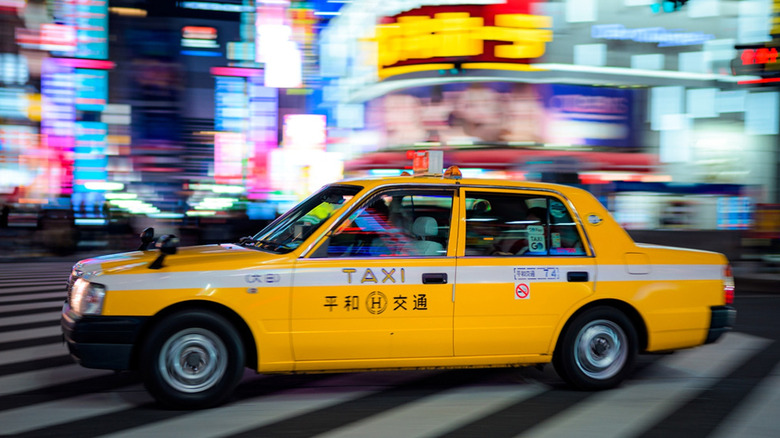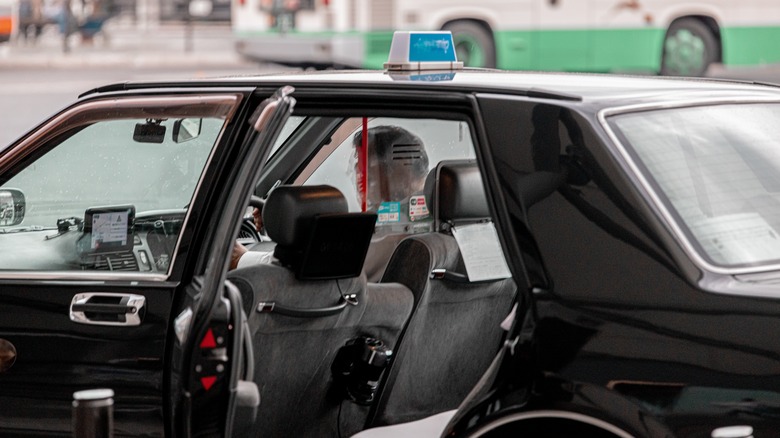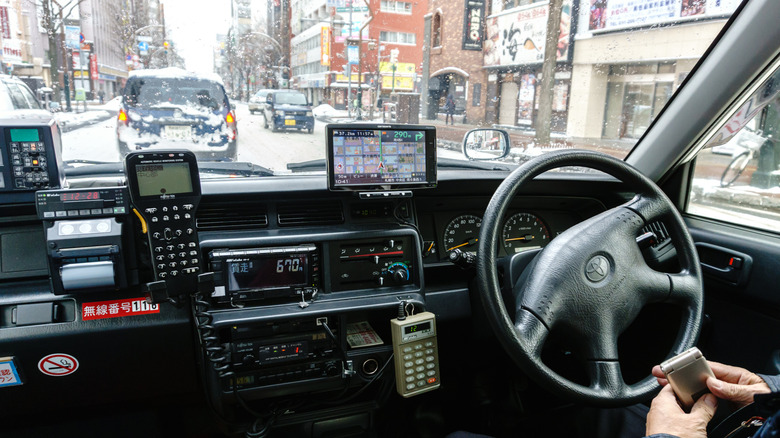The Unexpected Taxi Rule Every Tourist Should Know In Japan
Japan continues to be a top draw for visitors from around the world, which should come as no surprise. After all, this is a country that perfectly combines deep culture and tradition with dazzling, cutting-edge modernity. In just one day you can stroll amongst the tranquil temples and shrines of Kyoto, and then (just a couple of hours later) lose yourself in the hyperkinetic, neon-lit sidestreets of Tokyo's Harajuku district.
One of the things that makes this possible is the country's world-class transportation system, which combines bullet trains, subway networks, and buses in a way that makes it easy and convenient to get almost anywhere during the day. There are times, however, when taking a taxi may be the better — if not only — option. This is true late at night after the trains have stopped running, and also in smaller cities and towns, where public transportation choices are more limited.
Like most anything in Japan, taxis are immaculately clean and almost always driven by uniformed, white-gloved drivers who pilot their vehicles with the utmost competence and care. They also offer a level of courtesy rarely seen in other countries. This comes at a premium, however. Taxis in Japan are anything but cheap, and along with the price tag, there are a few things that tourists should never do in Japan, such as never opening the taxi door on your own.
Let your taxi driver do the work in Japan
Let's say you're in the laid-back, very delicious city of Fukuoka –– a verifiable hidden gem city in Japan. You've had a couple of beers along with a late-night bowl of ramen at one of the town's famous food stalls, and you're ready to go back to your hotel. You've missed the last train so you decide to hail a taxi. The driver slows down, and just as you reach for the rear passenger-side door, it pops open automatically.
Almost all drivers in Japan have an electrical control up front that opens your door for you. This is to ensure the highest level of service since taking a taxi in Japan is almost akin to riding in a limousine, as well as a way to protect the driver's safety. The passenger is never expected to open their own door, so just sit back and enjoy being treated like minor royalty.
You can catch taxis at designated taxi signs or using online apps such as Japan Taxi, Tokyo Taxi Association, and Tokyo Musen –– all of which are available in English. It's also very possible to wave one down from the street as long as you are aware that the color of their lit-up sign tells you everything you need to know: Red means available, green means reserved, and no light signifies that the taxi is out of service.
Other taxi etiquette tourists should know while in Japan
Another thing to keep in mind when taking a taxi in Japan is don't try to overload the car. Four passengers (three in back, one in front) is considered the maximum and drivers won't put up with you attempting to squeeze in more. Also, make sure to have your destination written down (in Japanese if possible), since most drivers don't speak English and can easily just plug the address into their car's navigation system. If you don't know the address, you can also try pointing it out on a map.
Most taxis in Japanese cities take credit or debit cards, though that might not be the case in rural areas. When paying in cash, avoid trying to break large bills because the driver may not have exact change to hand back. Also, keep in mind that what you see is what you get. Except for some set prices to popular attractions and airports, you will be charged exactly what shows on the meter(plus any tolls incurred on the way) and fares go up by 20% between the hours of 10:00 p.m. and 5:00 a.m. Don't attempt to haggle with your driver, either. That's just not done in Japan. Also, it is not customary to tip and, in some cases, may even make your driver feel uncomfortable.
If you make a mistake or two when using a taxi in Japan, don't beat yourself up. This is a country that is very used to seeing visitors, which makes the locals more understanding when tourists are unaware of local etiquette. Still, it's good to educate yourself on what to do and what not to do, so here are some ways to be a considerate guest when visiting the Land of the Rising Sun.


